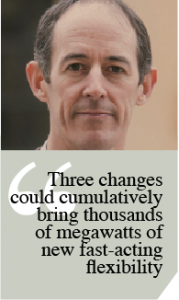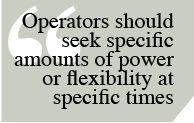There is “at least 500MW and possibly as much as 1,000MW” fast response batteries that could be deployed within a year if National Grid ESO (NGESO) tweaked the rules for balancing the network, according to Habitat Energy’s co-founder Ben Irons.
 There is some way to go before the BM becomes more fit for modern purposes, he says. But while waiting for dispatch systems to catch up with assets available, Irons proposes an interim solution. That is to recognise the value of so-called imbalance chasing as a means to balance the system without NGESO dispatch being necessary (properly, ‘net imbalance volume’ or NIV chasing). At the moment, plant cannot be registered as a Balancing Market (BM) participant and NIV-chase. But Irons says: “If NGESO is not able to manage the BM in a way that fully exhausts all the system need, due to software constraints, or lack of visibility, or forecasts that can’t keep up with the sophistication of new assets, [NGESO] has nothing to lose by allowing asset owners or optimisers to unilaterally help them outside the system rules.”
There is some way to go before the BM becomes more fit for modern purposes, he says. But while waiting for dispatch systems to catch up with assets available, Irons proposes an interim solution. That is to recognise the value of so-called imbalance chasing as a means to balance the system without NGESO dispatch being necessary (properly, ‘net imbalance volume’ or NIV chasing). At the moment, plant cannot be registered as a Balancing Market (BM) participant and NIV-chase. But Irons says: “If NGESO is not able to manage the BM in a way that fully exhausts all the system need, due to software constraints, or lack of visibility, or forecasts that can’t keep up with the sophistication of new assets, [NGESO] has nothing to lose by allowing asset owners or optimisers to unilaterally help them outside the system rules.”
He has suggested that option to NGESO and found the SO ready to listen to the proposal, he said.
That is a tweak to the market that could take effect quickly. If it did, Irons thinks a “vast volume” of investors are ready to install new batteries, with sites in place, EPCs lined up, warranties designed and planning set to go.
 It will happen quickly, he says, because it is just an addition to the investment case: these projects, typically distribution-connected batteries, are “waiting for the investment model to get a bit more certain or the returns to get a tiny bit higher to justify the risk.
It will happen quickly, he says, because it is just an addition to the investment case: these projects, typically distribution-connected batteries, are “waiting for the investment model to get a bit more certain or the returns to get a tiny bit higher to justify the risk.
This is one of three market changes that Irons proposes in an interview in the November issue of New Power Report. Subscribers can click here to download the issue.
Not yet a subscriber? New Power is a specialist report for anyone with an interest in the UK energy industry. We look in-depth at all the issues that have to be addressed to rebuild our industry – moving from our centralised high-carbon power system to one that will provide heat and power securely, affordably and with minimal carbon dioxide emissions. Contact [email protected] to find out more.